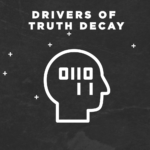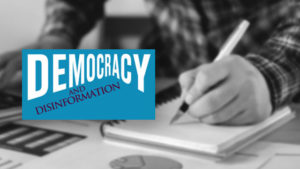A new report from the Stanford History Education Group that found little change in high school students’ ability to evaluate information online since 2016, when the Stanford researchers released the results of a similar study.
 Communities are being ripped apart as prejudice, hate and disinformation are peddled online. We’re at a tipping point. How we respond to this abuse will determine whether the web lives up to its potential as a global force for good or leads us into a digital dystopia, adds Tim Berners-Lee, the inventor of the World Wide Web and a co-founder of the World Wide Web Foundation.
Communities are being ripped apart as prejudice, hate and disinformation are peddled online. We’re at a tipping point. How we respond to this abuse will determine whether the web lives up to its potential as a global force for good or leads us into a digital dystopia, adds Tim Berners-Lee, the inventor of the World Wide Web and a co-founder of the World Wide Web Foundation.
The web needs radical intervention from all those who have power over its future: governments that can legislate and regulate; companies that design products; civil society groups and activists who hold the powerful to account; and every single web user who interacts with others online, he writes for The Times. Which is why he is introducing a new approach – the Contract for the Web – a global plan of action created over the past year by activists, academics, companies, governments and citizens from across the world to make sure our online world is safe, empowering and genuinely for everyone. RTWT
The EU doesn’t have a sense of its disinformation problem – this report suggests the policy changes it can make,  Nieman Lab reports. For European media to thrive in an increasingly confusing environment, it needs three things: freedom, funding, and help finding a future. In that order, according to a new report from the Reuters Institute for the Study of Journalism (HT; NED’s Center for International Media Assistance).
Nieman Lab reports. For European media to thrive in an increasingly confusing environment, it needs three things: freedom, funding, and help finding a future. In that order, according to a new report from the Reuters Institute for the Study of Journalism (HT; NED’s Center for International Media Assistance).
Democracies are at risk from foreign disinformation attacks when there is at least an authoritarian neighbor with strong Internet censorship as an indicator of online warfare capacity, with implied geopolitical competition, a new analysis contends. Regional autocracy promotion and democratic resilience can co-exist, argue analysts Chun-chih Chang, Min Chiao Chang and Thung-Hong Lin, drawing on V-Dem’s Digital Society Project and political-economic indicators from 160 countries from 2001 to 2017:
- On one hand, authoritarian regimes disseminate fake news to interfere functions of democratic regimes in the region.
- On the other hand, democracies with higher educated citizens still demonstrate their resilience to defeat the infringement of fake news abroad.



 At the same time, Twitter surfaced
At the same time, Twitter surfaced 





